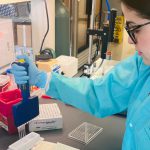“Polio eradication began in Pittsburgh with Dr. Salk’s revolutionary vaccine,” Dr. Burke said. “It is entirely fitting that I lend my support to finishing his work. I believe that the plan proposed by the Global Polio Eradication Initiative is achievable if it receives appropriate support from public health officials, organizations and governments here and worldwide.”
The more than 400 signatories to the declaration urged governments, international organizations and civil society to do their part to seize the historic opportunity to end polio and protect the world’s most vulnerable children and future generations from this debilitating but preventable disease. The declaration calls for full funding and implementation of the Polio Eradication and Endgame Strategic Plan 2013-2018, developed by the Global Polio Eradication Initiative. With polio cases at an all-time low and the disease remaining endemic in just three countries (Afghanistan, Nigeria and Pakistan), the plan estimates that ending the disease entirely by 2018 can be achieved for a cost of approximately $5.5 billion.









